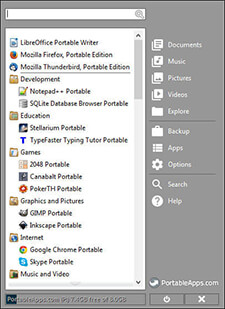Portable Software
Portable software is software that runs from a removable storage device, such as a USB flash drive. It does not need to be installed on a computer to run and does not store data on the host system. Instead, all user settings and related files are stored on the removable drive.
Portable software can refer to 1) individual portable applications or 2) portable software platforms.
1. Individual portable applications
Applications that run from external media without requiring installation are considered portable apps. For example, LibreOffice and OpenOffice are both available in "portable" versions that can be run from a flash drive. Examples of other portable apps include Blender Portable – a 3D modeling application, Eclipse Portable – a software IDE, and Media Player Classic Portable – a media playback program. All of these programs are available in both standard and portable versions.
2. Portable software platforms
Since there are many portable applications available, it is common to include multiple apps on one removable drive, managed by a single portable platform. By consolidating all your portable apps on one device, you can bring your desktop applications – along with all your files and settings – with you wherever you go. The most popular portable platform is PortableApps.com, which supports over 300 portable applications. Other portable platforms include Ceedo, winPenPack, and SmartKey, the successor to the U3 platform developed by SanDisk.
The main benefit of portable software is that you can run applications on any compatible machine. However, it also provides a security benefit since all your settings are stored on the removable storage device. This provides a means of "sandboxing," which prevents unwanted files or malware from being written to your device.
 Test Your Knowledge
Test Your Knowledge